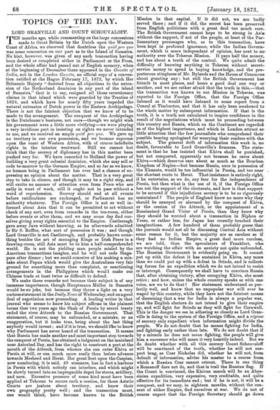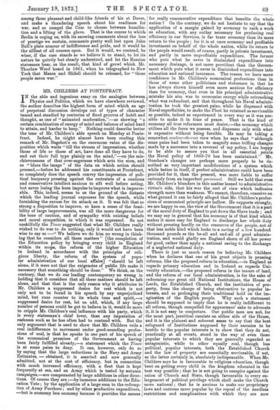TOPICS OF THE DAY.
LORD GRAlsTVTILE AND COUNT SCHOUVALOFF.
TENmonths ago, while commenting on the large concessions made to Great Britain by the Dutch upon the Western Coast of Africa, we observed that doubtless the quid pro quo was some concession on our part as to the Island of Sumatra. No hint, however, was given of any such transaction having been desired or completed either in Parliament or the Press, and the whole affair had passed out of English memory, when at the beginning of December there appeared in the Gazette of India, not in the London Gazette, an official copy of a conven- tion ratified at the Hague February 17, 1872, by which Her Britannic Majesty "desisted from all objections to the exten- sion of the Netherland dominion in any part of the island of Sumatra," that is to say, resigned all those reversionary claims in that island which were guarded by the Treaties of 1824, and which have for nearly fifty years impeded the natural extension of Dutch power in the Eastern Archipelago. There is not the faintest objection that we know of to be made to the arrangement. The conquest of the Archipelago is the Dutchman's business, not ours—though we might wish his government were a little more vivifying—we were playing a very invidious part in insisting on rights we never intended to use, and we received an ample quid pro quo. We gave up no territory in our own possession, and we became supreme upon the coast of Western Africa, with of course indefinite rights in the interior westward. Still •we cannot but think that the secrecy of diplomacy has in this matter been pushed very far. We have conceded to Holland the power of building a very great colonial dominion, which she may sell or cede to-morrow to the German Empire, and so far as we know, no human being in Parliament has ever had a chance of ex- pressing an opinion about the matter. That is a very great step to take in silence, and though it may be a right step, and will excite no manner of attention even from Peers who are sat-11y in want of work, still it ought not to pass without a word of reprehension. Secrecy should end at all events before ratifications are exchanged, or Parliament has no authority whatever. The Foreign Office is not so well in- formed about Asia that it can be permitted to act without check of any sort, even from remarks in the tea-room, either before events or after them, and we may some day find our- selves giving away rights essential to the Empire. Castlereagh gave away Java without knowing, as he afterwards admitted to Sir S. Raffles, what sort of possession it was ; and though Lord Granville is not Castlereagh, and probably knows some- thing besides the art of managing Kings or Irish Peers in a drawing-room, still Asia must be to him a half-comprehended world. He is not the yielding man people misled by the American transactions imagine, and he will not cede Singa- pore after dinner ; but we could conceive of his making a mis- take about Papua which would give the Australians very fair ground for something more than complaint, or sanctioning arrangements in the Philippines which woull make our Chinese trade at least twice as difficult to defend.
We make these remarks not because their subject is of any immense importance, though Hauptmann Muller in Sumatra would be no joke, but because they throw a light on a very curious statement iii the Daily News of Wednesday, and on a good deal of negotiation now proceeding. A leading writer in that journal who seems to know his subject affirms in the plainest terms that two years ago the Shah of Persia by secret treaty ceded the river Attreck to the Russian Government. That statement, of course, may be unfounded, or a mistake, or an exaggeration, but it looks true, being about the last thing anybody would invent ; and if it is true, we should like to know why Parliament has never heard of the transaction. It means that-Russia has made another and most important step towards the conquest of Persia, has obtained a lodgment on the mainland near Astrabad Bay, and has the right to construct a port at the mouth of the Attreck, from whence she can enter Khiva or Persia at will, or can much more easily than before advance towards Mesheed and Herat. Her great fleet upon the Caspian, now numbering, it is said, 49 steamers, has in fact a harbour in Persia with which nobody can interfere, and which might be slowly turned into an impregnable depot for stores, artillery, and men. Excessive pressure of some kind must have been applied at Teheran to secure such a cession, for these Asiatic Courts are jealous about territory, and know their own geography pretty well ; and the transaction must, one would think, have become known to the British Mission in that capital. If it did not, we are badly served there ; and if it did, the secret has been preserved from English politicians with a great deal too much care. The British Government cannot hope to be strong in Asia-. without the support, if not of the people, at least of the Par- liamentary personages who, as to this transaction, have been kept in profound ignorance, while the Indian Govern- ment, which is more independent of opinion, has next to no authority over the Teheran Mission. It pays half the money, and has about a tenth of the control. We quite admit the difficulty of knowing anything in Teheran without secret- service money to spend in buying knowledge, and the pre- posterous stinginess of Mr. Rylands and the House of Commone about granting any ; but still the British Government has friends in most places, and hears a good deal one way or- another, and we are rather afraid that the truth is this,—that the transaction was known to our Mission in Teheran, waFs. reported to the Foreign Office, that the Foreign Offioe listened as it would have listened to some report from a Consul at Timbuctoo, and that it has only been awakened to the whole matter by subsequent information. If that is the truth, it is a truth not calculated to inspire confidence in the result of the negotiations which must be proceeding between this country and Russia, which on the Continent are regarded' as of the highest importance, and which in London attract so- little attention that the few journalists who comprehend their possible bearing apologised for wearying their readers with the subject. The general drift of information this week is, no, doubt, favourable to Lord Granville's firmness. The state- ment is that he has insisted that Khiva shall be punished,. but not conquered, apparently not because he cares about Khiva—which deserves care about as much as the Bourbon. Kingdom of Naples—but because Russia, once in possession of the Khanato, would be too influential in Persia, and too near- the shortest route to Herat. That insistance is entirely right, if he entertains, as we do, any fear for the independence of Persia, but then what is the use of it, if the Foreign Office has not the support of the electorate, and how is that support. to be secured if this injudicious secrecy is to be so rigorously maintained The people of England know no more why they should be annoyed or alarmed by the conquest of Khiva, or the cession of the Attreck, or the appointment of Russianised Grand Vizier of Persia, than they know why they should be worried about a transaction in Niphon or- Yesso, or rather less, for Japan has recently touched their- imaginations. A few hundred of them probably guess that the journals would not all be discussing Central Asia without some reason for it, but the majority are as careless as if they had no Indian Empire, a great deal more careless, we are told, than the speculators of Frankfort, who. are watching the-affair with an anxiety not quite unfounded. TheRussian Government is evidently going on. It cannot put up with the defeat it has sustained in Khiva, any more than we could put up with a defeat in Scinde, and is collect. ing forces for an expedition which we do not intend to resist or interrupt. Consequently we shall have to convince Russia. that, after obtaining victory, after occupying Khiva, she must retire ; and how, unless the whole country speaks as with one voice, are we to do that ? Her statesmen understand us per- fectly well, and know that no unpopular war will ever be- waged by this country, while they have not the faintest means of discerning that a war for India is always a popular war, that the English electors do not intend to give their empire- up, and will fight for Scinde as they will fight for CornwalL This is the danger we see in adhering so closely as Lord Gran- ville is doing to the system of the Foreign Office, and a re'gitne- of secrecy only expedient when information might divide the- people. We do not doubt that he means fighting for India, and fighting early rather than late. We do not doubt that if by a miracle he does not mean fighting, the people will give him a successor who will mean it very heartily indeed. But we do doubt whether with all this secrecy Count Schouvaloff will be convinced of the truth, whether he will not sus- pect brag, as Czar Nicholas did, whether he will not, from default of information, advise his master to a course from which a Russian Czar cannot retreat. There is one thing a Romanoff dare not do, and that is trail the Russian flag. If the Count is convinced, the Khivan march will be an Abys- sinian expedition, very expensive, very creditable, and quite effective for its immediate end ; but if he is not, it will be a conquest, and we may, in eighteen months, without the con- sent of either Empire, find ourselves at war. We do not of course expect tha the Foreign Secretary should .go down among those pleasant and child-like friends of his at Dover, and make a thundering speech about his readiness for war, and so compel the Czar to choose between humilia- tion and a lifting of the glove. That is the course to which. Berlin is urging us, with its sneering comments about the loss of prestige we sustain, comments pretty well lost upon John Bull's plate armour of indifference and pride, and it would be the silliest of all courses open. But it would, we contend, be wiser, if the case stands as we believe it to stand, to let its nature be quietly bat clearly understood, and let the Russian statesmen hear, as the result, that kind of growl which Mr. Thurlow Weed heard in 1861, when he telegraphed to New York that Mason and Slidell should be released, for "these people mean war."



































 Previous page
Previous page